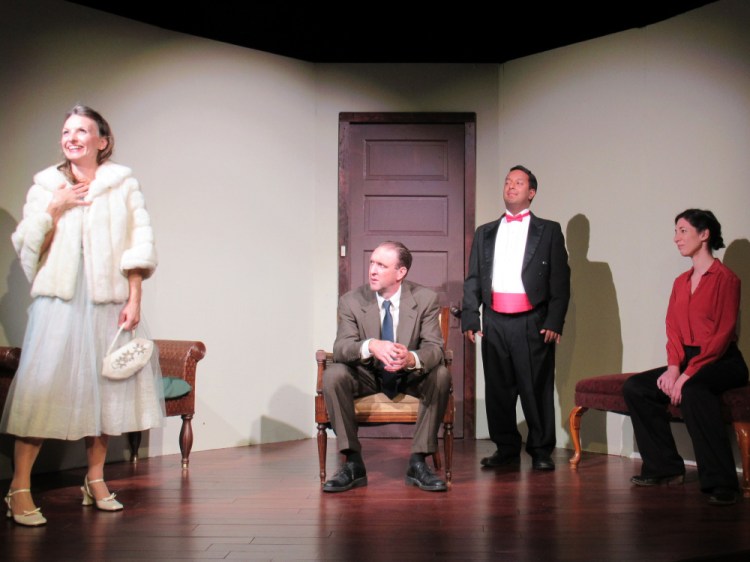“Hell is other people” may not be the best line to use for most social occasions. But those words carry a lot of dramatic weight in the latest production from the Pie Man Theatre Company.
“An Evening in Hell” pairs Jean-Paul Sartre’s legendary “No Exit,” where that line about other people first shocked the public, with Josh Brassard’s new, Sartre-inspired “Hell Is.” They make for an intense and absorbing double bill of one-act plays.
Sartre’s play finds three recently deceased individuals consigned to a hell that’s not quite what they expected. There’s no fire or physical torture. They are simply locked into a small, sparsely furnished room by an unaccommodating valet. This room, they gradually come to realize, is where they will spend eternity.
Brassard, who also directed, plays Cradeau, a former journalist with a sketchy past that led to him being executed. He’s joined by Allison Kelly as Inez who, in an understatement, describes herself as “not a polite person.” Mary Fraser completes the trio as Estelle, a flighty socialite with a horrible secret.
The up-close atmosphere within the play matches well with the intimacy of the small Mayo Street performance space. Subtle facial expressions amplify Sartre’s words to convey the characters’ fears below the facades they try in vain to carry into the afterlife.
Kelly is particularly effective at revealing her character’s own “crime” through her visible disdain for and manipulation of the others. She firmly establishes that Inez holds the power in this play, even as she embraces despair. Fraser’s Estelle is not above some seductive tactics, but it’s the terror in her eyes that is most memorable. Brassard’s Cradeau has all the frustrations of a man who says he wants to be left alone to somehow reconcile his life choices.
Danny Gay’s brief role provides some comic relief as his Valet relishes the others’ enervating descent into hell.
Featuring the same cast but directed by Stephanie Ross, “Hell Is” takes off from the setting of “No Exit.” This time, the inhabitants of the tiny onstage room are Sartre himself, along with his lover, the feminist Simone de Beauvoir; fellow writer Albert Camus; and, lover to all three, actress Wanda Kosakiewicz.
Realizing the situation, Sartre (Brassard) wishes to make clear that “This is not my play.” He’s quickly corrected that “You got the afterlife right,” as they all begin to rehash their relationships.
Camus (Gay), de Beauvoir (Fraser) and Kosakiewicz (Kelly) air grievances against the defensive Sartre as all make their way toward a conclusion that hell can be understood in more personal ways.
Brassard, Ross and company add nuance to an evening that raises some big questions.
Steve Feeney is a freelance writer who lives in Portland.
Send questions/comments to the editors.



Success. Please wait for the page to reload. If the page does not reload within 5 seconds, please refresh the page.
Enter your email and password to access comments.
Hi, to comment on stories you must . This profile is in addition to your subscription and website login.
Already have a commenting profile? .
Invalid username/password.
Please check your email to confirm and complete your registration.
Only subscribers are eligible to post comments. Please subscribe or login first for digital access. Here’s why.
Use the form below to reset your password. When you've submitted your account email, we will send an email with a reset code.